This is the web version of the December 2023 edition of the Center for an Informed Public‘s News & Insights newsletter that was originally sent out on December 14, 2023.
ESSAY
Facts, frames and (mis)interpretations: Understanding rumors as collective sensemaking
Although fabrications and outright lies certainly contribute to the challenge of misinformation, in a December 6 essay, CIP director and co-founder Kate Starbird writes that “we are more often misled not by false evidence but by misinterpretations and mischaracterizations — dynamics of a collective sensemaking process gone awry.”
NEWS
With new IMLS grant, CIP researchers launch program to create a comprehensive information literacy program for public libraries
CIP researchers, who were recently awarded $750,000 in funding from the Institute of Museum and Library Services, are starting work on a three-year project to create a comprehensive, nationwide information literacy program that aims to increase capacity for library staff and community members to address and navigate problematic information in their local communities.
WE’RE HIRING
CIP seeks applications for postdoctoral scholar positions
 The CIP is particularly interested in studies of information flow in sociotechnical systems; the role of information in the formation and dynamics of values, beliefs, or identities (race, gender, class, ability, etc.); and the role of researchers, educators, librarians, and policy makers in supporting healthy information environments and fostering a more informed and equitable society.
The CIP is particularly interested in studies of information flow in sociotechnical systems; the role of information in the formation and dynamics of values, beliefs, or identities (race, gender, class, ability, etc.); and the role of researchers, educators, librarians, and policy makers in supporting healthy information environments and fostering a more informed and equitable society.
SOCIAL MEDIA
Advertiser influence and platform accountability: The X dilemma
 Content providers and advertisers have always had a complicated relationship. They rely upon each other to keep viewers engaged and returning, but what happens when they are no longer in sync? The recent sponsor exodus from social media platform X (formally Twitter), offers a compelling example, CIP legal fellow Elissa Melendez writes in a blog post.
Content providers and advertisers have always had a complicated relationship. They rely upon each other to keep viewers engaged and returning, but what happens when they are no longer in sync? The recent sponsor exodus from social media platform X (formally Twitter), offers a compelling example, CIP legal fellow Elissa Melendez writes in a blog post.
SPOTLIGHT
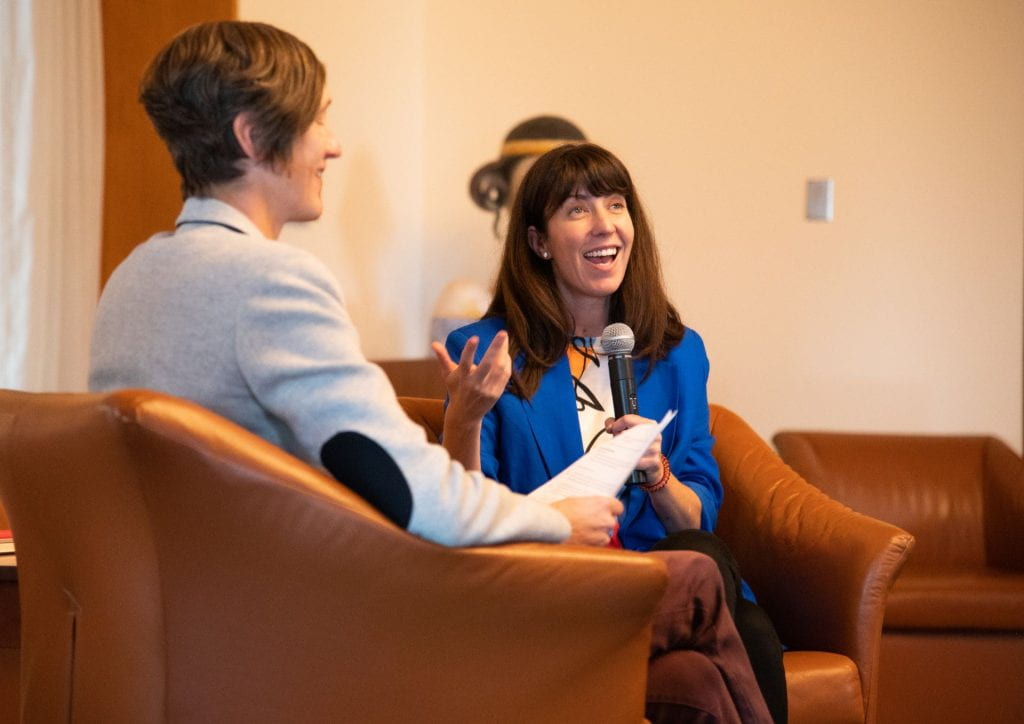
Honoring Francesca Bolla Tripodi, winner of the 2023 CIP Award for Impact & Excellence
During a special gathering and discussion this fall, we honored University of North Carolina at Chapel Hill assistant professor Francesca Bolla Tripodi, selected earlier this year as the winner of the 2023 CIP Award for Impact & Excellence, for her research, including ethnographic observations of two Republican groups over the course of the 2017 Virginia gubernatorial race and her firsthand experience of the 2017 Unite the Right rally in Charlottesville. The award event featured a conversation between Tripodi and CIP director Kate Starbird.
PEOPLE
CIP welcomes two new postdoctoral scholars, Mert Can Bayar and Yiwei Xu
 Mert Can Bayar joined the CIP from Binghamton University’s Political Science Department and studies public opinion and democracy, focusing on conspiracy theories and evolving attitudes on democracy and autocracy. Yiwei Xu joined the CIP from Cornell University’s Department of Communication. Her work examines and develops theory-driven communication strategies that address persistent and emergent public health challenges.
Mert Can Bayar joined the CIP from Binghamton University’s Political Science Department and studies public opinion and democracy, focusing on conspiracy theories and evolving attitudes on democracy and autocracy. Yiwei Xu joined the CIP from Cornell University’s Department of Communication. Her work examines and develops theory-driven communication strategies that address persistent and emergent public health challenges.
INSIGHTS
In UW Public Lectures talk, CIP’s Jevin West discusses the power, potential and pitfalls of generative AI
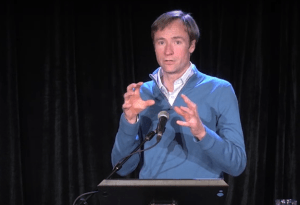 During “Generative Misinformation,” an October 27 talk at Town Hall Seattle sponsored by the UW Graduate School’s Office of Public Lectures, Information School associate professor and CIP co-founder Jevin West discussed how generative artificial intelligence is making it more challenging to make sense of the information we see online and understand what’s taking shape in the world around us.
During “Generative Misinformation,” an October 27 talk at Town Hall Seattle sponsored by the UW Graduate School’s Office of Public Lectures, Information School associate professor and CIP co-founder Jevin West discussed how generative artificial intelligence is making it more challenging to make sense of the information we see online and understand what’s taking shape in the world around us.
LAW & POLICY
‘What the law can and can’t do about misinformation’
During a virtual event co-hosted with UW Impact, CIP co-founder Ryan Calo, a professor in the UW School of Law and Information School, explored the ways AI threatens to exacerbate the problem of misinformation, and what steps we can take to protect our society without sacrificing our commitment to free speech.
RESEARCH
The ‘new elites’ of X: Identifying the most influential accounts engaged in Hamas/Israel discourse
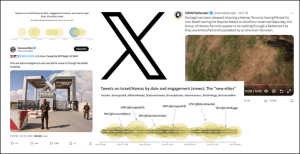 CIP RAPID RESEARCH REPORT | Through a novel data collection process, a team of CIP researchers identified highly influential accounts in Israel-Hamas war discourse on X that comprise the most dominant English-language news sources on Twitter for the event. In an October 20 CIP rapid research report that focuses on the first three days of the conflict, Mike Caulfield, Mert Can Bayar and Ashlyn B. Aske compare these accounts to traditional news sources and find on average they have far fewer subscribers while achieving far greater views, are of more recent popularity, and show a greater posting frequency.
CIP RAPID RESEARCH REPORT | Through a novel data collection process, a team of CIP researchers identified highly influential accounts in Israel-Hamas war discourse on X that comprise the most dominant English-language news sources on Twitter for the event. In an October 20 CIP rapid research report that focuses on the first three days of the conflict, Mike Caulfield, Mert Can Bayar and Ashlyn B. Aske compare these accounts to traditional news sources and find on average they have far fewer subscribers while achieving far greater views, are of more recent popularity, and show a greater posting frequency.
- Read the CIP’s October 20 rapid research report.
- The CIP’s report has been cited in recent weeks by NBC News, The New York Times, The Washington Post, The Atlantic, WNYC Public Radio’s “On the Media” and Cyberscoop.
- In a November 7 article for Nature, “The new Twitter is changing rapidly — study it before it’s too late,” Mike Caulfield observes: “In my more than ten years in this field, I’ve never seen an almost entirely new set of accounts come to dominate a major platform in less than a year.”
***
YouTube search surfaces good information about the causes of the Lahaina wildfire, but external links reveal a different world
CIP RAPID RESEARCH REPORT | In late August, CIP research scientist Mike Caulfield and director Kate Starbird co-authored a rapid research report examining a variety of “planned crisis event” narratives on X, formerly known as Twitter, that shared unfounded claims that the destructive and deadly Lahaina, Maui wildfire earlier that month was part of a secret plan. At the same time, they found that YouTube’s search interface surfaced reliable information about the wildfire’s causes, even when prompted with a search targeted at bringing up coverage of non-existent deliberate causes.
***
Social truth queries: Development of a new user-driven intervention for countering online misinformation
PEER-REVIEWED RESEARCH | In an article published in the Journal of Applied Research in Memory and Cognition in November, CIP researchers and colleagues present the promising results of three experimental investigations testing the potential effectiveness of a novel, user-driven approach to addressing online misinformation. The new approach involves responding to posts containing false information with “truth queries,” or questions that draw attention to truth or criteria used to judge truth, such as the presence of evidence or the credibility of the information’s source. This research was led by CIP postdoctoral scholar Madeline Jalbert with assistance from former CIP researcher Morgan Wack (now at Clemson University) and other colleagues at UW and USC.
***
CIP researchers examine selective and deceptive quotation of scientific work
PEER-REVIEWED RESEARCH | In a Science Advances article published September 23, a team of CIP researchers compiled one of the largest, hand-coded citation datasets of cross-medium science communication, derived from approximately 5 million tweets of people discussing masks between March 2020 and April 2021. The researchers, led by UW HCDE doctoral candidate Andrew Beers, focused their attention on how “science communicators” — writ large to include both mainstream science journalists and practiced conspiracy theorists — can reshape and transform scientific evidence in ways that may deviate from its authors’ intents. Beers’ co-authors are Information School doctoral candidate Sarah Nguyễn, CIP director and HCDE associate professor Kate Starbird, and CIP co-founders Jevin West and Emma Spiro, both iSchool associate professors.
EDUCATION
CIP experts share media literacy insights during WA Senate Early Learning & K–12 Education Committee presentation
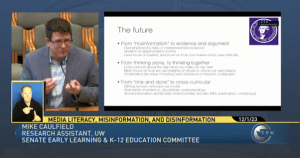 During a Washington Senate Early Learning & K–12 Education Committee work session presentation in Olympia on December 1, CIP co-founder Jevin West and research scientist Mike Caulfield discussed ways educators should approach the teaching of media literacy skills amid today’s volatile and rapidly evolving online information environments.
During a Washington Senate Early Learning & K–12 Education Committee work session presentation in Olympia on December 1, CIP co-founder Jevin West and research scientist Mike Caulfield discussed ways educators should approach the teaching of media literacy skills amid today’s volatile and rapidly evolving online information environments.- EdSurge interviews Mike Caulfield: “How to help students avoid getting duped online — and by AI chatbots”
***
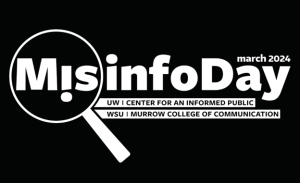 Attention educators: Registration is open for MisinfoDay 2024 at UW, WSU and in your classroom
Attention educators: Registration is open for MisinfoDay 2024 at UW, WSU and in your classroom
MisinfoDay is an annual media literacy educational event co-hosted by the University of Washington’s Center for an Informed Public and Washington State University’s Edward R. Murrow College of Communication that helps students, teachers and librarians learn how to navigate complex information environments and make informed decisions about what to believe online. MisinfoDay 2024 will include in-person events at WSU Pullman (March 8), UW Seattle (March 12), and WSU Vancouver (March 21), in addition to an option to participate from your classroom.
CIP IN THE NEWS
Misinformation researchers at UW will not buckle under political attacks
- Lawfare article by Kate Starbird: “A battle for better information”
- National Public Radio: “Why the fight to counter false election claims may be harder in 2024”
- The Seattle Times: “Attacked by conservatives, UW misinformation researcher gears up for 2024”
- KUOW Public Radio interviews Kate Starbird: “How the fight to stop election misinformation morphed into a free speech battle“
***



